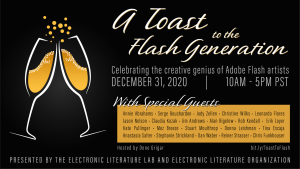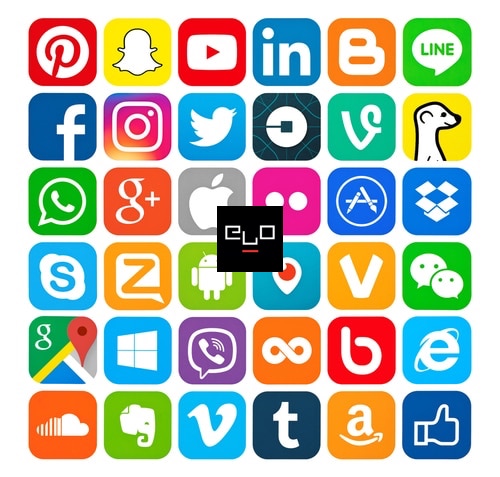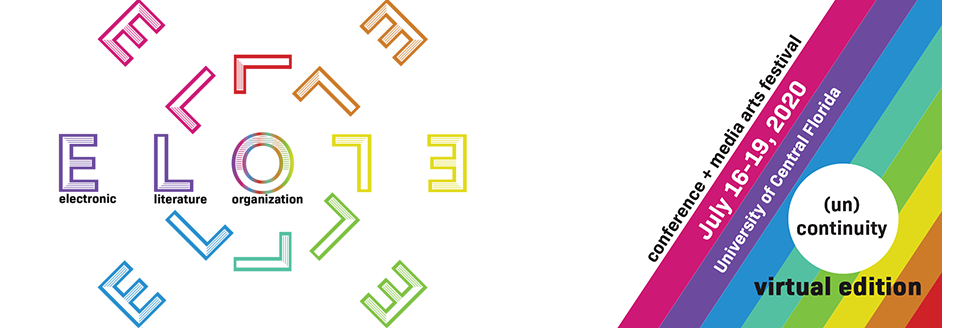ELO 2021 Conference and Festival: Platform (Post?) Pandemic
Co-chairs: Søren Pold, University of Aarhus and Scott Rettberg, University of Bergen
Dates
The academic conference will take place May 24-28th, 2021. Workshops will take place May 24-25 and the main conference will take place May 26-28th. The arts program will unfold over a longer span of time, with a series of events and exhibitions during March, April, and May 2021.
DEADLINES (Note Extensions)
Submission deadlines:
Academic Proposals: Jan. 15 Feb 1
Full Papers & Posters: April 28
Exhibitions:
Post-Human Electronic Literature: Jan 8 Jan 11
Covid E-lit: Jan. 8 Jan 11
Platforming Utopias (and Platformed Dystopias): Feb. 1
Kids E-Lit: Feb. 1.
Performances: Feb. 1 Feb. 8
Conference Theme
While international travel has become virtually impossible due to widespread restrictions, the pandemic has pointed to our global connectedness: this is an aspect of platformed culture we will embrace in this conference. For the first time, the ELO conference will not be constrained by orientation to a particular location or time frame, but will unfold over three days and be hosted by institutions in Scandinavia, India, and the United States in synchronous and asynchronous events taking place online around the clock, including presentations, exhibitions, performances, workshops, and social events.
Globalized platforms present new opportunities for writers and readers both because of their large audiences and the fact that new forms of electronic literary cultures are emerging around them. The current rise of global platforms and platform culture however challenge Electronic Literature’s history of developing independent, purpose-specific platforms, since commercial platforms are often closed formats with largely rigid templates for ‘content’. In this sense, forms of criticality are challenged by the fact that the platforms are typically owned, maintained and often quickly updated (and sometimes made obsolete) by global corporations.
Digital platforms are not new: gaming consoles operating systems, programming languages and the web itself were discussed as platforms before the current platformization. The integration of hardware and software in many platforms has been seen in gaming consoles, PCs, phones and tablets, and can be seen as a result of initiatives from the fields of ubiquitous computing, Internet of Things and business strategies leading to the design of walled gardens. With the combination of social media, apps, search engines and targeted advertisement, platformization has become increasingly dominant in digital media. The platformization of culture is highlighted during the COVID-19 pandemic as physical platforms for art, culture and the public have become difficult to access at times where physical meetings, travel, public institutions and life in general have been challenged. Digital platforms have entered into our most private and intimate spaces, raising questions about surveillance, capture, and who’s reading our reading and writing. Connecting, meeting, working and reading on platforms have been defining moments for our contemporary life during the pandemic comparable to the way the clock defined industrialized life. What do digital and digitization mean now, and what is left out and missing when culture is streamed?
Globalization has become less seamless, as global trade and collaboration is affected, but we are more connected in our individual lives and worries. Furthermore, the big, rapid changes of culture and society during the pandemic have raised fundamental questions about other urgent challenges: the climate crisis, equality in relation to race and ethnicity, the social, and the liberation and equality of gender and sexuality. The pandemic situation has led to both hope and despair in relation to new and old political struggles such as the #metoo and #BlackLivesMatter movements, which have also been fought on and off platforms.
With this conference we aim to investigate how the future will be platformed: what will come after the pandemic and how can we explore this from the pandemic? The pandemic will not be over when we meet on the conference platforms, rather it is a condition from which to rethink and explore the future, and learn from how life has changed during this period: What has the pandemic crisis made us see that was not before apparent to us, and how do we build upon the lessons we have learned to develop a more sustainable and equitable future? We seek explorations and research into electronic literature that examines how we are platforming the future. What are the practices and poetics of contemporary electronic literature? How to thrive as electronic readers and writers within the constraints of platform culture? How to be critical on and of platforms? How to develop alternative literary platforms? What are the global dimensions? How do we connect and disconnect on platforms? What could and should platform e-lit be? How does platform culture relate to the traditions and history of electronic literature?
The conference theme can be addressed in several ways including the following:
-
Platform electronic literature: How does data and literary production, writing and reading practices converge in platforms? How does electronic literature inhabit platforms? How are new forms and audiences developed? How is electronic literature hosted, exhibited, archived, disseminated and cared for with and in platforms?
-
Platform history: Historical platforms and electronic literature, platform obsolesence, and the constant upgrade.
-
Platform determinism, dependence and criticism: To what extent does platform determine literary practice and genre? To what extent are the forms and genres of electronic literature limited by our dependence on particular platforms? And how can we best archive and preserve platform-dependent e-lit? To what extent do literary practices work against the grain of platforms or reshape them? How is electronic literature critical on and of platforms?
-
Pandemic platforms: How have the specific circumstances of the pandemic affected the production of electronic literature and the cultural practices surrounding it? What are our post-pandemic cultural platforms going to be?
-
Platform politics: Hashtag movements and platforms for change. Platforms as ways of organising political activity.
-
Platform utopia: speculative futures, alternative platforms, writing for difference.
-
Platformed globalisation and colonialism: How are new global and local forms of electronic literature emerging? How does electronic literature deal with globalisation and new forms of (post-)colonialism? E-lit in different continents, countries and languages.
-
Platform identities: Identification, profiling, identity politics, race & ethnicity, gender and sexuality.
-
Platform culture: (Dis-)connection: (anti-)sociality, (not)meeting, (un)care.
-
Platform performance: Literary programming, live-coding, algorave, and other forms of performance that take place within platforms.
-
Platform literacy: multisensory reading, mobile and spatial reading, reading contexts and voices, reading of generated, profiled and dynamic/streaming text, platform and narrative.
-
Digital literary audio platform: audio walks, ambient literature, site specific audio stories, voice assistants and other audio interfaces.
-
Platforms for digital literacy: What sorts of platforms and creative works best serve the needs of young digital readers? Platforms for children’s E-lit.
We will strive for maximum open accessibility in archiving and disseminating all conference outputs.
Keynote speakers will be selected by the conference committee to respond to the conference theme.
Types of Conference Submissions Accepted
-
Full papers: 2,000-4,000 words. Full papers will be accepted via a two-stage submission process, with an abstract of 500 words for the first submission deadline and full papers due by April 28th. Full papers will be published open access on the conference site and the ELMCIP database. We will also strive to find journals who will consider selected papers for special issue publication. Full paper presenters will also participate in a live roundtable discussion of their papers (5-minute presentation plus discussion). Accepted abstracts will be grouped into peer panels, and peers will be asked to give feedback on each other’s papers.
-
Panel presentations: Proposals for panel presentations including 3-5 presenters for a one-hour session. Panels may include a series of short presentations bound by a theme or may feature a roundtable discussion of a particular topic or project. Abstract submission max 500 words.
-
Posters: We will accept submissions of one-page posters in PDF format (A4, A3, or A2 size) to illustrate a project or theme in visual format. Posters can include links to interactive, networked and dynamic content not hosted at the conference site. Posters will be displayed on the conference site and will be discussed in a virtual poster session with short lightning talks. Abstract submission max 500 words. Complete poster due by April 28th.
-
Workshops: We will accept proposals for workshops based on live hands-on activities, demonstrations, tutorials etc. Abstract submission max 500 words.
-
Virtual Engagement Events: sessions based on innovative strategies for creating engagement and connection. Abstract submission max 500 words.
The primary shared language of the conference will be English, and abstracts should be submitted in English, though we welcome proposals for papers, panels and presentations in other languages.
Submissions are restricted no more than two per person.
Submissions to the academic program will be due Jan. 15th Feb 1, 2021.
Accepted full papers and posters will be due April 28, 2021.
Exhibition Submissions
Exhibitions for ELO 2021 will unfold on an extended time scale from March-May 2021. All exhibitions will be fully exhibited online, though some will also include local physical exhibitions. Jason Nelson will be the main exhibition coordinator.
The following exhibitions will be part of the festival:
-
Posthuman Electronic Literature. An online exhibition with a projection exhibition component focused on electronic literature and media art that addresses posthumanism. To be featured during European SLSA conference at the University of Bergen. Curated by Joseph Tabbi, Scott Rettberg, Jason Nelson, Eamon O’Kane. MARCH 4-7, 2021. Submissions accepted until Jan 8th, 2021.
-
COVID E-Lit. An online exhibition of works that respond thematically to the pandemic and/or are produced within the specific context of platform culture during the pandemic. A library exhibition version of the exhibition will also be produced. Curated by Anna Nacher, Søren Pold, and Scott Rettberg. APRIL 2021. Submissions accepted until Jan 8th, 2021.
-
Flashback: A special celebration of Flash and Shockwave e-lit held in the Electronic Literature Repository with artists on hand to talk about their work. Curated by Dene Grigar at Washington State University Vancouver’s Electronic Literature Lab. MAY 24-28, 2021.
-
Platforming Utopias (and Platformed Dystopias): This will be the largest open submission exhibition, responding to the conference theme. MAY 24-28 2021. Submissions accepted until February 1st, 2021.
-
Platform as a place of study – E-lit as already decolonised: A series of exhibitions, workshops and activities focused on Indian and Asian E-Lit that will unfold through Spring 2021. MARCH-MAY 2021. Call will be announced separately. Curated by dra.ft
-
Kid E-Lit: An online exhibition of electronic literature for young audiences, and work work by young authors. Curated by Mark Marino and Maria Goicoechea. MAY 24-28, 2021. Submissions accepted until February 1st, 2021.
Not all works submitted need to be designed specifically for the online context. Documentation of other sorts of work, such as material artifacts, printed materials, installations, may also be submitted, along with a plan to exhibit them online. Digital materials can also be exhibited in non-web formats, such as a VR space. Each of the open submission exhibitions have separate submission requirements.
Performance Submissions
Ian Hatcher will be the main curator of the Performance program. For performance submissions, we will accept both submissions for live virtual events and for pre-recorded events that have taken place in a live venue. Performance time for synchronous events. should be specified as short (up to 8 minutes) or long (up to 15 minutes). In addition, we will accept proposals for keynote performances (up to 30 minutes), for 2-3 slots that will be featured in the program. Recorded performance videos or other documentation of live performances may also be submitted for an asynchronous exhibition. Submissions accepted until February 1st 8th, 2021.
Submissions are accepted on EasyChair: https://easychair.org/conferences/?conf=elo2021
Conference Fee
The conference fee will be $100 plus ELO membership for employed academics. The conference fee portion will be waived for independent artists and researchers without institutional support (by request). The conference fee will support technical infrastructure, development and costs related to exhibitions.
Division of Responsibilities
The leadership responsibilities for the conference academic program and arts program will primarily shared between Aarhus University (Academic program, led by Søren Pold) and the University of Bergen (Arts program, led by Scott Rettberg), working in close coordination. Two additional partners include Washington State University Vancouver’s Electronic Literature Lab (led by Dene Grigar) and the India-based dra.ft collective (led by Nanditi Khilnani).
We plan for the conference to unfold in multiple time zones with synchrous activities organized by the partners in India (dra.ft), Scandinavia, and the United States of America.
About the partners
The Electronic Literature Organization (ELO) https://eliterature.org is an international organization dedicated to the investigation of literature produced for the digital medium. Founded in Chicago, Illinois in 1999, the ELO now has a presence across North America and in South America, Europe, Asia, Australia, and Africa. Our members hail from a wide array of disciplines and areas of study, including Art, Literature, Communication, Computer Science, Humanities, Digital Humanities, Media Studies, Womens’ Studies, and Comparative Media.
Aarhus University, Digital Aesthetics Research Center https://darc.au.dk/. Digital Aesthetics Research Centre (DARC) functions as a shared intellectual resource that identifies, analyses, and mediates current research topics within digital art and culture; producing experiments, research projects, publications and public events. The aim is to create a space for critical reflection on digital cultural transformation. The centre was formed in 2002. The purpose of the centre is to bring together researchers at Aarhus University with an interest in digital art and culture (net., software, code, sound etc.). The centre organises invited talks, seminars and conferences like the seminal Read_me conference and Runme Dorkbot City Camp in 2004. DARC has hosted research projects such as The Aesthetics of Interface Culture, published working papers and dissertations on digital art and culture.
DARC maintains its focus on bringing together researchers at Aarhus University, forming research projects, collaborations and international networks. We publish newspapers and a journal, APRJA, arrange yearly international PhD seminars (with transmediale festival and shifting partners), internal research seminars, larger research conferences, and organize public exhibitions and events with digital media artists and researchers from around the world. Besides contributing analytically and theoretically to the field, DARC also engages in practical experiments (often in collaboration with artists and practitioners). DARC researchers have for example collaborated with Danish and international libraries for more than 10 years on promoting and exhibiting electronic literature.
University of Bergen, Bergen Electronic Literature Research Group: The Bergen Electronic Literature Research Group (BEL), led by Professor Scott Rettberg, studies literary works created for digital media and related digital art forms. An important project for us is the ELMCIP Electronic Literature Knowledge Base, the most extensive open-access research database in the field. Our research often combines theory and practice, as in the award-winning VR narrative Hearts and Minds, winner of the 2016 Robert Coover Award for a Work of Electronic Literature. Members of our group frequently publish scholarship on electronic literature, including recently Electronic Literature by Scott Rettberg (Polity, 2018), described by prominent e-lit theorist N. Katherine Hayles as “a significant and important book by the field’s founder that will be the definitive work on electronic literature now and for many years to come” and the two volume Post-Digital: Debates and Dialogues from the Electronic Book Review (Bloomsbury, 2020), edited by Joseph Tabbi.
BEL frequently organizes international symposia and workshops, such as the Electronic Literature Knowledge Base Symposium and EcoDH seminar in 2018 and welcomes international speakers and visiting researchers. In 2015 we hosted the international Electronic Literature Organization conference and literary arts festival. We embrace innovative forms of scholarly publishing, such as a four-part series of collaborative articles, conversations and interviews on the Metainterface and critical works of artistic digital media published in 2018-19 in the electronic book review. BEL has published annual reports documenting group activities since 2011, which are available in the Knowledge Base.
Washington State University Vancouver‘s Electronic Literature Lab (ELL): Founded and directed by Dr. Dene Grigar, ELL is a media archaeology lab created for the advanced inquiry into the curation, documentation, preservation, and production of born digital literary works and other media. It serves as the site of digital preservation for the ELO and, so, manages the organization’s archives and repository. Additionally, ELL has hosted numerous post-doctoral scholars and has served as the site of numerous research projects, including Pathfinders(Grigar and Moulthrop, 2015) and Traversals (Moulthrop and Grigar, 2017); prominent exhibits of electronic literature at the Library of Congress, International Symposium on Electronic Art, the British Computer Society, and other venues; five to seven Live Traversals of early born-digital literature each year; and an annual publication entitled Rebooting Electronic Literature that documents its many activities. It has been supported by grants, most notably from the National Endowment for the Humanities (2013) and the Andrew W. Mellon Foundation, and through the university’s Lewis E. and Stella G. Buchanan Distinguished Professorship. Finally, the lab reconstitutes outmoded e-lit works, most recently Annie Grosshan’s The World Is Not Done Yet and Deena Larsen’s Kanji Kus. They are currently rebuilding Erik Loyer’s Strange Rain, Christy Sanford’s Red Mona, and Richard Holeton’s Figurski at Findhorn on Acid. Collaborating with Grigar on the conference will be Holly Slocum, ELL’s Project Manager; Nicholas Schiller’s ELL’s Associate Director, Mariusz Pisarki, ELL 2020-2021 Research Affiliate, Greg Philbrook, ELL’s Technical Specialist, and Kathleen Zoller, ELL’s Undergraduate Researcher.
dra.ft: dra.ft is a movement, a festival, a community, a long-term research project that explores emergent ideas of text and its future. It draws from the idea of poetic computation where the machine and author are collaborators. It is in these intersectional spaces that we can produce, perform and embody new meanings and develop new texts. The festival dra.ft encourages unfinished, work in progress, prototypes, tests (essentially drafts) of texts and text-making.
dra.ft is now an active online community of writers, designers and creative technologists engaging through virtual events, meet-ups and online social spaces.




